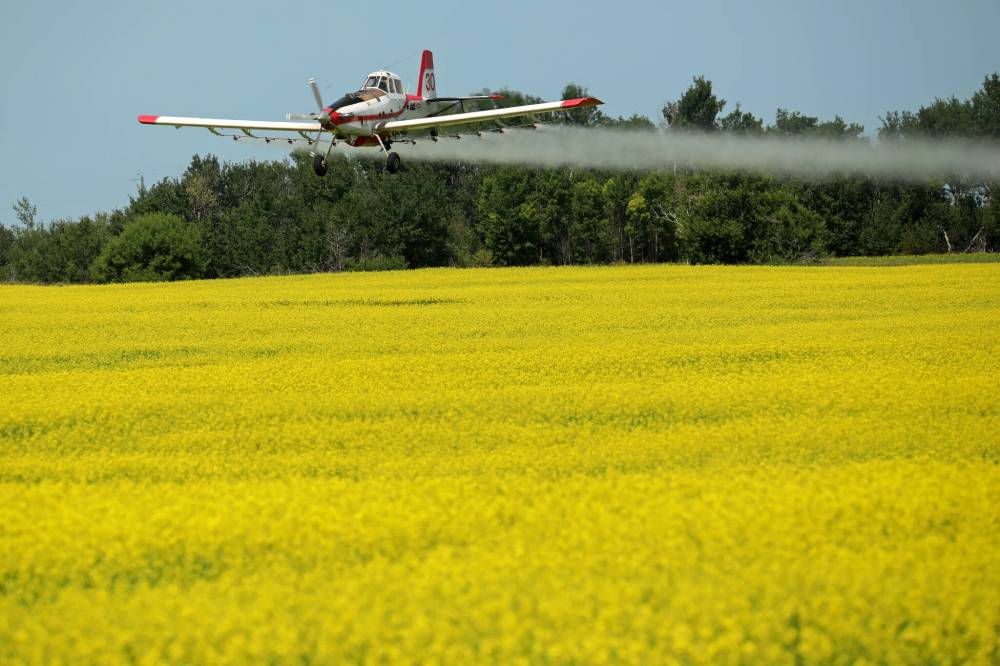Canola farmers are caught in crossfire
Advertisement
Read this article for free:
or
Already have an account? Log in here »
We need your support!
Local journalism needs your support!
As we navigate through unprecedented times, our journalists are working harder than ever to bring you the latest local updates to keep you safe and informed.
Now, more than ever, we need your support.
Starting at $15.99 plus taxes every four weeks you can access your Brandon Sun online and full access to all content as it appears on our website.
Subscribe Nowor call circulation directly at (204) 727-0527.
Your pledge helps to ensure we provide the news that matters most to your community!
To continue reading, please subscribe:
Add Brandon Sun access to your Free Press subscription for only an additional
$1 for the first 4 weeks*
*Your next subscription payment will increase by $1.00 and you will be charged $20.00 plus GST for four weeks. After four weeks, your payment will increase to $24.00 plus GST every four weeks.
Read unlimited articles for free today:
or
Already have an account? Log in here »
Yesterday morning, the Chinese government announced the imposition of a 75.8 per cent preliminary tariff on Canadian canola imported into that nation. It says that the charge is the result of a year-long anti-dumping investigation that found Canadian canola was being “dumped” into the Chinese market, and that the nation’s domestic canola oil market is suffering as a consequence of that activity.
This is a serious allegation. Dumping occurs when a product is sold into a foreign market at a lower price than what that same product is normally sold for in its home market, or at a price that is below the actual cost of production. It is sometimes used as a way to increase market share in a foreign market, but more often occurs when goods are exported at artificially low prices in order to harm competitors in the importing nation.
China is a significant producer and consumer of canola, with production for the 2025-26 crop year estimated to amount to almost 16 million tonnes. That is an impressive figure, but China relies heavily on imports of canola seed to meet demand within its borders, particularly for animal feed. Much of that imported canola comes from Canada each year.

An aerial sprayer flies over a canola field in bloom west of Rivers. This may be tough to hear, but we fired first with tariffs on Chinese EVs, and China is firing back with a tariff on canola. Unfortunately, it's farmers who are caught in the middle. (Tim Smith/The Brandon Sun files)
Canada, on the other hand, grows approximately 20 million tonnes of canola annually. That accounts for more than 30 per cent of the world’s canola supply and 60 per cent of the global trade in canola.
Given those two realities — China must import huge amounts of canola annually and Canada has huge amounts of canola available for export — the foundation for a mutually beneficial trading relationship should be obvious, and that had been the case for several years until recently.
What has changed that justifies this interruption to that relationship? The answer is that Canada’s canola exports to China — and, by definition, Canada’s canola producers — are collateral damage in a high-stakes game of tit-for-tat trade policies between the two countries.
Last year, the Canadian government imposed 100 per cent tariffs on Chinese electric vehicles to protect Canadian auto producers. It justified tariffs on the basis that Chinese EVs are much less expensive than North American-made EVs because of lower labour and environmental standards, and state subsidies.
Then-prime minister Justin Trudeau argued the levy was appropriate because “Actors like China have chosen to give themselves an unfair advantage in the global marketplace, compromising the security of our critical industries and displacing dedicated Canadian auto and metal workers. So, we’re taking action to address that.”
The competing strategies should be readily apparent. The Canadian government imposed a huge tariff to keep Chinese EV makers out of the Canadian market, so the Chinese government responded by levying a huge tariff to push Canadian canola producers out of that market. As a result of those actions, Canadian drivers are deprived access to affordable Chinese-made EVs, while Canadian canola producers are effectively shut out of an important market for their product.
How does that benefit Canadian farmers and drivers?
It doesn’t. We have argued in the past that it is unfair for Canadian canola producers, and the provincial economies where they live, to be penalized because of a federal government policy that is intended to protect auto sector jobs in Ontario and Quebec. That argument is even stronger as a consequence of the imposition of yesterday’s new Chinese tariff.
We agree with Clean Energy Canada, which argued last month that allowing a limited number of Chinese EVs into the Canadian market “would open Canada’s vehicle market to fill important market gaps, drive innovation and ultimately make our auto sector more competitive.”
Such a step could be good for Canada’s consumers and automakers, and could also be an important lever for a negotiated end to Chinese tariffs on Canadian canola.
When it comes to trade disputes, it is easy to see ourselves as victims, but the factual reality is that the new canola tariffs are the Chinese response to Canada’s imposition of politically motivated tariffs against Chinese EVs.
We fired first, and they fired back. In the meantime, Canadian canola producers are caught in the crossfire and paying a heavy price.
This cannot continue. It is time to bring this dispute to an end, just as it is time for cooler heads and rational trade policies to prevail. If we stop playing games to prevent Chinese EVs from being available in Canada, perhaps China will stop playing games with Canadian canola.
